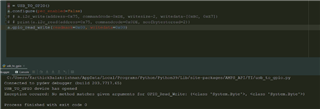Hello Matt Schurman,
Hope you're doing good!!! the Fusion API is working fine for send_byte(), write_byte(), and i2c_write/read() functions. But it's not working for this gpio_read_write() function and that got raised an exception. the example code and error snippet has attached here FYR.
import clr, array # Import clr from 'pythonnet' to interface runtime engine with .net
from System import Byte, Int32, Array
class USB_TO_GPIO(object):
def __init__(self):
""" SAA adapter constructor - discovering a device via the SMBus API.
This library file provides you with the information required to use functions for remotely controlling your instrument.
from usb_to_gpio import USB_TO_GPIO # Importing USB_TO_GPIO file
TI = USB_TO_GPIO() # Initialize & opens an instrument reference
TI.configure(pec_enabled=False) # Selects 100-KHz/400-KHz bus speed & PEC mode
TI.send_byte(dev_addr=0x001, cmd_addr=0x00) # Performs a “Send_Byte”
TI.write_byte(dev_addr=0x01, cmd_addr=0x00, data=0x00) # Performs a “Write_Byte”
TI.close() # Close the device reference
"""
try:
clr.AddReference("C:\\Program Files (x86)\\Texas Instruments Fusion API\\Library\\TIDP.SAA.dll") # Load the dll file(C:\\ folder)
import TIDP.SAA as API # Import TIDP.SAA dll file
if API.SMBusAdapter.Discover() != 0: # Find an adapter
self.device = API.SMBusAdapter.Adapter # Import class from C# namespace
print("USB_TO_GPIO device has opened")
self.adapter_status = 1 # If adapter found
else:
print('No Adapter Found')
self.adapter_status = 0 # If adapter not found
except:
self.import_error()
self.status = 0 # To read the device write/read status
def __repr__(self):
''' print statement to compute the "informal" string representation of an object '''
return repr(self.adapter_status)
def close(self):
try:
self.device.Dispose()
print('USB_TO_GPIO device has closed')
except Exception as ex:
self.exception_handler(ex)
###########################################
# Error Handler
###########################################
def import_error(self):
''' Update import error reported by the system of loading dll driver error.
'''
print("dll file not loaded, 'TI USB-TO-GPIO driver was not present/installed'.")
exit()
def exception_handler(self, exception):
print("Exception occured:", exception)
###########################################
# SMBus Adapter
###########################################
def configure(self, pec_enabled:bool=False):
''' Select 100-KHz/400-KHz bus speed & PEC mode'''
try:
self.device.Set_Bus_Speed(self.device.BusSpeed.Speed100KHz)
self.device.Set_PEC_Enabled(pec_enabled)
except Exception as ex:
self.exception_handler(ex)
def send_byte(self, address:int=0x70, commandcode:int=0x04):
'''
Wrapper for SAA Write Byte Function, explicitly states which overload to use in Fusion API
Args:
(uint8) dev_addr = PMBus Slave Address (0-127) - b'\x7F'
(uint8) cmd_addr = PMBus CMD Address (0-255) - b'\xFF'
Returns:
(bool) True if successful
(bool) False otherwise
'''
try:
if self.device.Send_Byte(Byte(address), Byte(commandcode)) == 0: # 0 = received acknowledgement
return 'Success'
except Exception as ex:
self.exception_handler(ex)
def write_byte(self, address:int=0x70, commandcode:int=0x04, writedata:int=0x00):
'''
Wrapper for SAA Write Byte Function, explicitly states which overload to use in Fusion API
Args:
(uint8) dev_addr = PMBus Slave Address (0-127) - b'\x7F'
(uint8) cmd_addr = PMBus CMD Address (0-255) - b'\xFF'
(uint8) data = Data Byte to Write (0-255) - b'\xFF'
Returns:
(bool) True if successful
(bool) False otherwise
'''
try:
if self.device.Write_Byte(Byte(address), Byte(commandcode), Byte(writedata)) == 0: # 0 = received acknowledgement
return 'Success'
except Exception as ex:
self.exception_handler(ex)
def read_byte(self, dev_addr, cmd_addr):
'''
Wrapper for SAA Write Byte Function, explicitly states which overload to use in Fusion API
Args:
(uint8) dev_addr = PMBus Slave Address (0-127) - b'\x7F'
(uint8) cmd_addr = PMBus CMD Address (0-255) - b'\xFF'
Returns:
(uint8) Data Byte if successful
NACK otherwise
'''
try:
status = self.device.Read_Byte(Byte(dev_addr), Byte(cmd_addr))
if status.SAA_Status == 'ACK':
return int(status.Data.Hex, base=16)
else:
return 'NACK'
except Exception as ex:
self.exception_handler(ex)
def i2c_write(self, address:int=0x70, commandcode:int=0x04, writesize:int=0, writedata=[0x00]):
'''
Wrapper for SAA Write Byte Function, explicitly states which overload to use in Fusion API
Args:
(uint8) dev_addr = PMBus Slave Address (0-127) - b'\x7F'
(uint8) cmd_addr = PMBus CMD Address (0-255) - b'\xFF'
(Int32) dataLen = Data Byte length - 0
(uint8) data = Data Byte to Write (0-255) - b'\xFF'
Returns:
(uint8) Data Byte if successful
NACK otherwise
'''
try:
returnvalue = self.device.I2C_Write(Byte(address), Byte(commandcode), Int32(writesize), Array[Byte](array.array('i', writedata)))
self.status = returnvalue
except Exception as ex:
self.exception_handler(ex)
def i2c_read(self, address:int=0x70, commandcode:int=0x04, noofbytestoread:int=0):
'''
Wrapper for SAA Write Byte Function, explicitly states which overload to use in Fusion API
Args:
(uint8) dev_addr = PMBus Slave Address (0-127) - b'\x7F'
(uint8) cmd_addr = PMBus CMD Address (0-255) - b'\xFF'
(Int32) dataLen = Data Byte length - 0
(uint8) data = Data Bytes to read (0-255)
Returns:
(uint8) return Data Bytes if successfully read
'''
try:
returnvalue = self.device.I2C_Read(Byte(address), Byte(commandcode), Int32(noofbytestoread))
returnvalue = returnvalue.Data.Hex[2:]
b = []
for i in range(0, len(returnvalue), 2):
b.append(int(returnvalue[i:i + 2], base=16))
returnvalue = b
self.status = returnvalue
return returnvalue
except Exception as ex:
self.exception_handler(ex)
def gpio_read_write(self, readmask:int=0x00, writedata:int=0x04):
'''
Wrapper for SAA Write Byte Function, explicitly states which overload to use in Fusion API
Args:
(Int32) readmask = Reads(1) and/or writes(0) a GPIO. The readMask determines whether a given bit will be read or written.
If a bit in readMask is 1, then the corresponding GPIO will be read and the bit result placed in readData.
If it is 0, the corresponding bit will be written. The bit to write will be taken from writeData.
There are easier to use versions of this that do not use byte bitmasks.
(uint8) writedata = Data Byte to Write (0-255) - b'\xFF'
Returns:
(uint8) return Data Bytes if successfully read
'''
try:
returnvalue = self.device.GPIO_Read_Write(Byte(readmask), Byte(writedata))
returnvalue = returnvalue.Data.Hex
self.status = returnvalue
return returnvalue
except Exception as ex:
self.exception_handler(ex)



